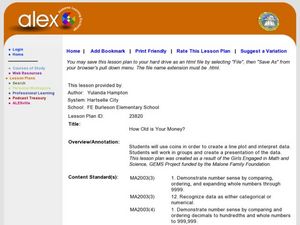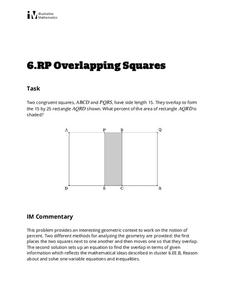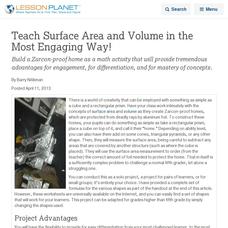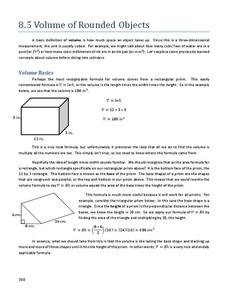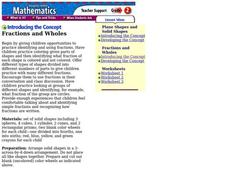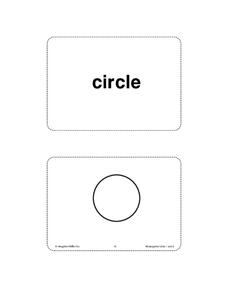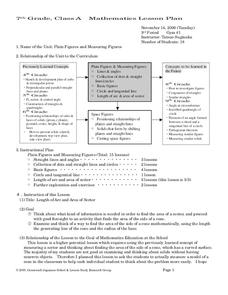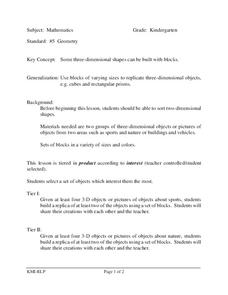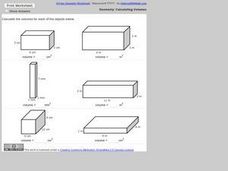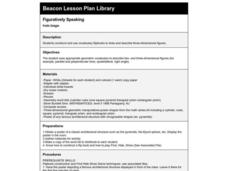Curated OER
Marshmallow Geometry
In this three-dimensional shapes geometry lesson, learners identify geometric solids and name their properties. They define "face," "edge," and "vertex," and construct geometric solids using marshmallows as vertices and toothpicks as edges.
Illustrative Mathematics
Computing Volume Progression 2
Once your geometers know how to apply the formula V = l w h, they will be ready to take on the fractional volume of a fish tank. Have your number crunchers swap heights so they can see that the fractional volume will not change.
Alabama Learning Exchange
How Old is Your Money?
Elementary learners explore coin mint dates. First, they listen to the book Alexander Who Used to be Rich Last Sunday by Judith Viorst. They then sort a collection of coins according to their mint date and put them in order from oldest...
Illustrative Mathematics
Overlapping Squares
The objective of this activity is to find the percent of the area of a two squares overlapping. Mathematicians find the ratio of area for the part that overlaps to the rectangle formed. The final answer is a percent as a rate per 100....
Illustrative Mathematics
3-D Shape Sort
From the apple on your desk and the coffee cup in your hand, to the cabinets along the classroom wall, basic three-dimensional shapes are found everywhere in the world around us. Introduce young mathematicians to the these common figures...
Curated OER
Great Shapes Alive!
Compare two- and three-dimensional shapes and construct three dimensional models from two-dimensional shapes. Diagram the shapes and reflect about the process in writing.
Curated OER
Teach Surface Area and Volume in the Most Engaging Way!
Build a Zarcon-proof home as a math activity that will provide tremendous advantages for engagement, for differentiation, and for mastery of concepts. This activity focuses specifically on surface area and volume using mathematical...
Utah Education Network (UEN)
Candies R Us
A box is fun to make, especially when it's a candy box! These activities help to cement understanding of the difference between surface area and volume. Have individuals measure the surface area of their box in two-dimensions before...
Curated OER
Classifying Three-Dimensional Shapes
Compare geometric solids based on their properties. Your emergent geometers use spaghetti and marshmallows to build models so they can examine the number of faces, edges, and vertices on polyhedra of their own creation. Resource includes...
Curated OER
Three Dimensional Figures
For this geometry worksheet, students study diagrams with labels of common geometric figures. Students then answer 24 questions. Then they draw and label their own figures.
Charleston School District
Volume of Rounded Objects
How much can different shapes hold? The answer varies depending on the shape and dimensions. Individuals learn the formulas for the volume of a sphere, cone, and cylinder. They apply the formulas to find the volume of these...
Super Teacher Worksheets
Solid Figures
In the hustle and bustle of everyday life it's easy to forget that geometric shapes are everywhere in the world around us. As they complete this shape identification worksheet, young mathematicians realize that many common real-life...
Curated OER
Writing Takes Shape!
Students read The Greedy Triangle and discuss geometric solids. In this geometry lesson, students list the geo-solids in the world and create a graphic organizer to show where geo-solids exist.
Virginia Department of Education
Mathematics Vocabulary Cards - Grade 2
Augment your math curriculum with posters detailing several concepts important to second grade math. Each poster features one math term from geometry, measurement, probability and statistics, computation and estimation, numbers and...
Curated OER
Fractions and Wholes
Lower elementary learners recognize solid shapes distributed for making fractions. Each individual uses a wheel and determine which part of a fraction is missing. This is a great lesson for your visual learners!
Houghton Mifflin Harcourt
Unit 3 Math Vocabulary Cards (Grade K)
Help young mathematicians develop understanding of math concepts with a set of 16 math vocabulary cards. Each sheet contains two cards; the top card has the vocabulary word printed in bold text. The bottom card has a picture representing...
Curated OER
Net "Working"
Upper elementary and middle schoolers explore the properties of various polygons. They use video, resource links, and engage in hands-on activities in order to construct geometric nets. This fine plan should lead to increased...
Curated OER
Geometric Solids
Fourth graders examine the properties of geometric solids. Given geometric figures, they brainstorm observations. In groups, 4th graders identify solids and discuss the physical properties. Each student creates a Venn diagram and...
Curated OER
Using Geometric Shapes in Architecture
Third graders identify two and three dimensional shapes used in architectural designs by viewing images on the Internet. In this geometry lesson, 3rd graders create their own building designs and identify the geometric shapes that will...
Curated OER
Plain Figures and Measuring Figures
Students investigate basic geometric concepts. In this geometry lesson plan, students explore solids through measuring and modeling. This assignment models the importance of understanding concrete objects in geometry.
Curated OER
Geometry
Students build replicas about nature and sports. In this geometry lesson plan, students build 3D replicas of nature and sports objects in teams.
Curated OER
Calculating Volumes
In this geometry worksheet, students, calculate the volume given the sides of the shapes. There are 6 questions dealing with volumes.
Curated OER
Figuratively Speaking
Third graders construct and use vocabulary flipbooks to draw and describe three-dimensional figures. They utilize worksheets and access websites imbedded in this plan which help them construct their books.
Curated OER
Similarity of Length, Area, and Volume
In this similarity worksheet, students determine the length, area and volume of similar figures. This three-page worksheet contains explanations, examples, and 20 problems. Answers are provided on page three.




